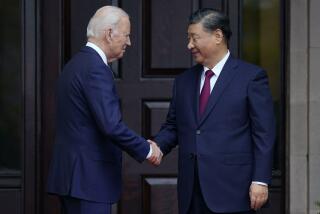Clues to What China Seeks in Visit
- Share via
WASHINGTON — When it comes to the modern-day relationship between America and China, you might say that Vice Premier Qian Qichen was present at the creation.
Qian, the vicar of Chinese foreign policy, is visiting Washington this week. You can be sure he knows the details and history of the last 12 turbulent years of U.S.-China relations better than any of the Bush administration officials he meets.
It was Qian who was photographed, smiling and contented, at a Beijing banquet in December 1989 as then-National Security Advisor Brent Scowcroft respectfully clinked glasses with him.
Only six months earlier, the Chinese regime had carried out its bloody crackdown on the nationwide demonstrations that began at Tiananmen Square. The elder George Bush, the current president’s father, dispatched Scowcroft to Beijing to put U.S.-China relations back onto a normal footing.
The mission failed. The image of an American presidential envoy toasting Qian amid the severe, ongoing Chinese repression provoked an understandable furor in the United States.
And the ensuing congressional uproar showed that there could be no restoration of the cozy, secretive, top-level relationship between America and China established after the Nixon opening.
In the U.S., the political dynamics involving China were permanently altered in 1989. Since then, China policy has been the subject of intense public scrutiny. President George W. Bush will have to deal with these dynamics, as his father and President Clinton did.
What will happen on Qian’s trip to Washington this week? How should we judge his visit, which will be the first top-level contact between the Chinese regime and the new Bush administration?
Don’t get too excited about any formal announcement of Bush’s plans to visit China in the fall. Such a trip has been in the works for months; after all, the annual meeting of Asian leaders will be held in Shanghai in October. It would be amazing if Bush didn’t attend the meeting and stop in Beijing on that trip.
Moreover, don’t expect any big announcements about the sensitive issue of U.S. arm sales to Taiwan.
To be sure, the Taiwan issue is what brings Qian to Washington right now. Taiwan is asking for an array of new weaponry--including sophisticated Aegis radar systems that could help protect Taiwan from Chinese missiles.
But the Bush administration isn’t going to make its Taiwan weapon decisions until the deadline in late April. (Even April, the end of an annual Pentagon review process for Taiwan, is only an artificial deadline. In 1992, the last Bush administration turned aside a request to sell F-16 warplanes to Taiwan in April and then approved it three months later.)
It’s also been fixed U.S. policy for 19 years--reaffirmed by Secretary of State Colin L. Powell--that the U.S. will not negotiate directly with China over what weapon systems America allows Taiwan to buy. Even if Bush were to make decisions now about arms for Taiwan, he wouldn’t say anything during Qian’s trip.
So what’s worth watching this week?
* Keep an eye out for new Chinese action on trade. There are reports Qian’s delegation may bring word of a decision aimed at speeding up China’s entry into the World Trade Organization.
China’s accession to the WTO has been held up by disputes involving agriculture and financial services. If China makes new concessions, that would be welcome news for Bush and his supporters in the American business community.
* Watch also whether Bush, Powell or Qian ever mentions Clinton’s “Three No’s” concerning Taiwan:
In 1998, Clinton asserted that the United States did not support 1) an independent Taiwan, 2) two Chinas or 3) Taiwan’s entry into any organization requiring statehood.
No other president had made such a strong, detailed public declaration circumscribing Taiwan’s status. The usual, vaguer U.S. formulation was that Taiwan’s future was up to the Beijing and Taipei governments to resolve. A number of U.S. scholars, including some often sympathetic to Beijing, have argued that Clinton’s Three No’s tilted too far toward China and away from democratic Taiwan.
So far, the new Bush administration hasn’t repeated Clinton’s Three No’s--and China seems to be giving Bush a break by not forcing the issue.
* Look at the images. In the pictures of his meeting with Qian, will Bush be jovial or solemn, smiling or frowning? Pictures may seem trivial, but they’re an important clue. The Chinese watch, study and care about them.
Bush too must know how significant photographs can be to China. When Scowcroft toasted Qian Qichen, Bush’s father learned that lesson the hard way.
A final note: This will be the last of my International Outlook columns. I’ll be moving on soon to different kinds of reporting and writing.
Over the last six years, I’ve appreciated the sophistication of the readers of this column. Thank you for your e-mails, letters and phone calls. You think a lot and care a lot. For U.S. foreign policy, that’s what counts.
More to Read
Sign up for Essential California
The most important California stories and recommendations in your inbox every morning.
You may occasionally receive promotional content from the Los Angeles Times.













